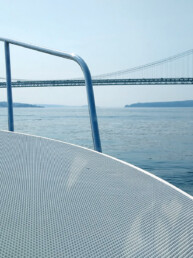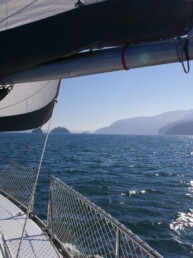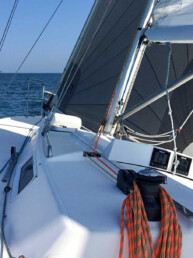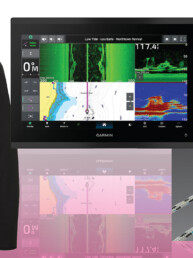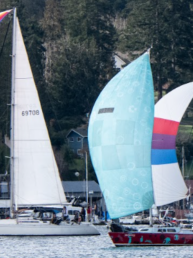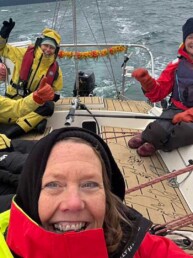A harrowing and heartening first-hand account from one of the crew who was swept overboard during the CYC Seattle Possession Point Race on March 8, 2025, and the incredible rescue that ensued.
“Well, I broke the first rule of sailboat racing.”
I got home from the airport Friday night excited for a day of racing on Saturday. I spent the night the same way I always do before a race—no alcohol, lots of water, and my bag packed and ready by the door. I knew my ratty, ancient, and trustworthy lifejacket was in the car. I had been checking the weather all week, and the HRRR model now predicted 15 knots out of the south in the morning, calming down to 10-12 after the start of the race. This was going to be my first race on my skipper’s new boat. She’s an absolute dream of a vessel, and I could not have been more excited.
The morning progressed just as expected, loading the boat and running lines. As soon as we left the breakwater, I remember noting that it was quite a bit more wavy than I anticipated, but that’s not out of the norm. My lifejacket went on not long after, and Brent Campbell and I started going over this new-to-us bow, familiarizing ourselves with everything we could. By the time the main went up, it was already blowing a little more than the prediction. We noted 18 knots as we went back and forth near the start. I went downstairs right before the start to put on one more set of socks so my feet wouldn’t get too cold… little did I know. When I came back up, my skipper asked if I was ready to go really fast. Heck yeah I was.
We got off the start line in a bit of a rush. With 3 minutes to go, Brent and I were hurriedly running tapes and rigging up the A2 spinnaker on deck. By the time we were satisfied and turned around to ask when we were starting, someone helpfully said “Now!” The kite wasn’t banded, so with me on the bow helping the tack out, Brent hauled it up with gusto. It popped beautifully, the jib came down, and we were off.
The speed is hard to describe. The boat didn’t even feel like she was trying, and all of a sudden we were doing 13 knots consistently, popping up to 16 on the right waves. All of us were calling out new top speeds as we saw them. Before long, the staysail was called for, and Brent and I went to the bow to get it up. This only made the boat feel more under control and capable, and our top speeds continued to climb. So did the wind. By now, we were looking at high teens, with the occasional 20-22 knot gusts. The staysail needs to be furled before each jibe, so every time we got the “ready about” call, I would pop forward and pull like heck on the furling line, and then jump back to help the kite around. We ended up on our last long jibe aiming for the Edmonds ferry dock, all of us astounded with how fast we’d made it up the Sound already. We had one more jibe, and then the staysail would come down, the jib would go up, the kite would come down, and we’d begin what I imagined would be an incredibly quick upwind and, ideally, win the race. If only…
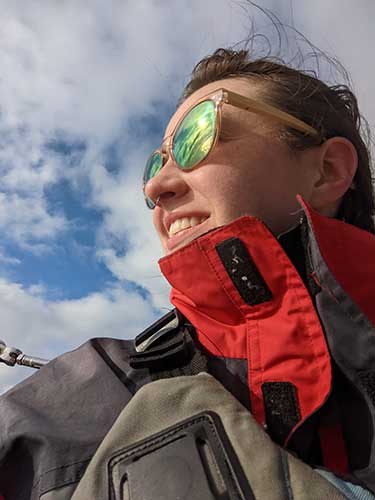
Before the last jibe, Brent and I had noted that the wind wasn’t going down. It was now sustained in the low 20s, with 3-4 foot tightly packed waves, and every gust launched us to yet another top speed. I saw 21.4 at one point, and my excitement, nerves, and heart rate all jumped at the same time. All I needed to do was help the boat through a few more maneuvers, and the rest of the day would be just as fun, but much calmer. The jibe went as smoothly as any of us could have hoped, and the boat went barreling down her layline toward the mark. Not long after, the staysail was furled, and Brent and I made the astute decision to throw it down the forward hatch, no organization, sheets and all. Brent grabbed the halyard and reminded me to dog the hatch when I was done. “Well, no duh,” I thought. We’d already seen green water over the bow.
At this point, I was in a place that only bow people understand—waiting for the call to get the jib up and the kite down, hoping they would give me lots of time. Eventually, it was confirmed we were on our last jibe, and I brought the lazy spin sheet around the bow and over the boom for a letterbox drop. The kite wasn’t going back up, so it felt like the safe and prudent option. The call came moments later, and up to the bow I went. Brent set himself up at the mast to raise the jib as soon as I had it clear. I scrambled over to the sail tie holding the jib and cleared it. Just as I looked forward to help feed the jib up (and maybe grab on to something more stable) the world turned upside down.
I watched the first bit of the wave come over the bow and thought, “Gosh darn it, I’m about to get soaked.” I knew it was going to go right down the front of my jacket, and I would have to spend the rest of the day soggy… Ah well, that’s the nature of the bow. But the water that hit me was so much more than a bucket to the face. Instead, I was instantly underwater. I felt myself sliding along the deck, cursing that I hadn’t grabbed onto something sooner. I thought I’d hit a stanchion any second, or the mast, or Brent, or a shroud… It wasn’t meant to be.
I later learned that the jib had gone over with the same wash of water, and removed everything in its path, snapping half the bow pulpit and two of the stanchions on the starboard side clean off. The next thing I knew, I was in open water. My first thought was, “Shoot, there goes my stellar track record of never falling off a boat.” My arms and legs were free, by some miracle, and I realized instantly there was officially nothing I could do to help my crew. I was now a problem for them, a man overboard. I had no control of anything other than keeping myself alive, and that was the best thing I could do for them.
It’s amazing how fast your mind works in these situations. I’ve been asked how long I was underwater, and I can’t even begin to guess. It might have been 10 seconds, a minute, a year, who knows. Logically, I’d say about 30-45 seconds from sitting on the bow to popping up in the waves. But my gosh did I think about a lot in that moment. I thought about the last hugs that I’d given my friends and family. I thought about everything I should have said to my husband that morning beyond the paltry, “I love you, hope you have a nice relaxing day.” I thought about my dad, still on deck, and what he would go through when he saw me in the water (one way or another). I thought about my crew and the fact that now more than ever, my life was in their hands. Mostly I decided that I really wanted to live.
The water was rushing around me like nothing I’ve ever felt, so opening my eyes never crossed my mind, but I knew picking a direction to try and swim was the wrong answer. I had no idea which way was up, but my lifejacket would get me there eventually. I felt around with my hands as best I could, and remember feeling boat, boat, boat, not air, just boat. I was afraid I would hit the keel or rudders or lines or sails and get hung up. I was terrified of getting stuck. It would have been so easy, but I didn’t. After my eternity underwater, all of a sudden there was air. Not enough air, but air. Filling my lungs seemed like an absolutely impossible task, but I sure got to trying.
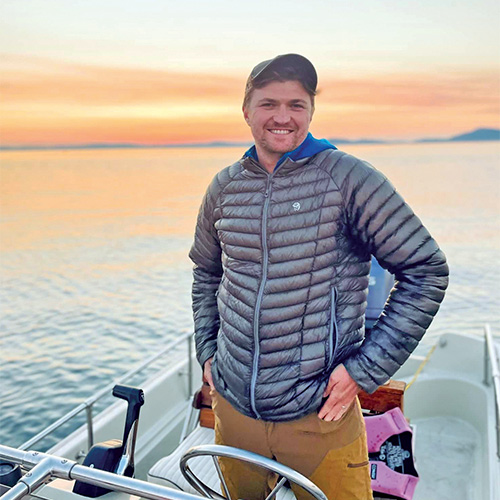
Photo by Sophie Curatilo.
The first thing I saw was the boat heeling at an unfortunate angle, and blowing away faster than I could ever hope to swim. I tried for a few seconds and quickly realized it was never going to happen, I would never make it. Then I saw the jib in the water, coming up from underneath on the port side. That wasn’t right. On deck, I saw our pit person, frantically working to get everything under control, our tactician frantically pointing at me, and then my dad. He had both hands on the lifelines and what I will tritely describe as a look of pure and absolute terror. But he saw me, he knew I was ok… ish. It was then that I looked around in the water and realized I wasn’t alone. Brent had catapulted from his position at the mast moments after I was swept away, also bound for an under-the-boat swim. He had already grabbed the MOM (man overboard module) that our skipper had launched, and swam to me while I tried to swim to him. In a blessedly short amount of time, we were together. We watched as the boat continued to drift away, thinking surely they’ll get everything under control in no time and come back for us. Right? Well, not exactly.
The Martin Breaker on the kite tack had broken free when the boat tried to become a submarine. It was flying remarkably clear but, no easy feat, the crew aboard got it down in no time. We knew it would take them time to get the lines clear of the water and to get the jib back aboard before turning the engine on and putting it in gear. Wrapping a prop in that moment would have been disastrous. According to those crew members who did not break Rule #1 of sailing, the jib got wrapped around the keel, and proved nearly impossible to bring aboard, even in pieces.
Brent and I could only watch and speculate as the boat got smaller, and the Sound began to feel so much bigger. We could see other boats on the course, but none came close enough to even try to yell for them. We watched the Farr 39ML Absolutely take her sails down, and prayed that she was coming to find us, not just calling it for the day. She was coming to find us, but had no idea where to begin. Even with the yellow, 6-foot-tall inflatable MOM mast above us, we were essentially invisible.
The conversations you have as two people who have just escaped death once but are very aware you’ll need to do it again are wild. Not spectacular or that abnormal for your average dinner party, but hearing about how someone met their spouse in that circumstance hits in a completely different way. Brent and I first established that personal bubbles weren’t a thing, and latched together. Losing each other would have been even more of a nightmare. The MOM unit provided extra floatation, for which I was incredibly grateful. I hadn’t tightened my lifejacket to ‘slightly uncomfortable’ that morning—a mistake I will never make again—and staying above the waves was a beast. Had my wits been about me, this should have been the moment I pulled the whistle out of my lifejacket pocket, where it lives tied for moments exactly like this, but I completely forgot about it. Soon enough, my fingers wouldn’t have enough function to open the zipper anyway.
After some long minutes, Brent asked if I was sure we were the only two in the water. I wasn’t, of course, we hadn’t been able to see the whole crew on deck in those moments. What a terrible feeling that was. He also commented that he was so glad he had put his lifejacket on that morning—he was the last one aboard to do so. I would have shamed the sh*t out of him well before the start if he hadn’t made the decision on his own. Wearing a lifejacket is a personal decision and all that, but I’m not above making someone feel terrible about not wearing one when necessary (for their own good, of course). Wear your lifejacket, people!
In between dinner party small talk, horrific situational discoveries, and monstrous waves, I informed poor Brent over and over that my toes were still wiggling, I couldn’t breathe, and I was very, very cold. If there was ever a time for dramatics, this was it. Oh, and I must have kicked him in the shins approximately 4,000 times. What a man overboard partner!
I was getting cold. The adrenaline and shock must have helped, but good heavens, that water was f***ing cold. I estimated low 50s when we were in it, but learned later that Puget Sound was at a whopping 47 degrees. At some point early on, I had grabbed the neck of my foulie jacket to close it as tightly as I could, and keep in as much slightly-warmer water as possible. In reality the cold didn’t matter—nothing could be done about it, and staying above the waves felt so much more important. Soon, I was just too tired, and needed my second arm to stay afloat, so each wave washed a whole new level of cold down my neck.
Finally, finally, finally, there were boats coming towards us. I know now that they weren’t looking for us specifically, we were just incredibly lucky that we went overboard on the layline. By later estimated observations, we had drifted approximately a third of a mile from the last known location provided to the Coast Guard. I remember seeing three race boats coming straight at us, and the hope began to build. There was no moment of “We’re saved!” at least for me, just a gradual build of hope.
The Aerodyne 43 Freya’s jib came down, more hope. When Freya turned around to come back to us, even more hope. I owe Freya all the thanks for indicating to the rest of the fleet where we were, but unfortunately they weren’t able to grab us. They had gotten their jib down, but not their main, and they couldn’t slow down enough to help us out of the water. They threw a LifeSling, but as I watched it go skipping across the waves right next to us, I knew trying to grab it was a bad idea. They tried for a second pass, but they were just going too fast.
Next came the J/111 Lodos. I’m grateful to everyone involved in our rescue, but to the crew of Lodos: three cheers, hip-hip hooray, and a round on me. They had followed right behind Freya and took down all sails in case they could help. This is also about the time I looked up to see the bow of the Edmonds-Kingston ferry, Suquamish, standing-by upwind to provide a wind shadow to aid the rescue. While logically I knew they were there to help me, looking at the length of a ferry from the water was frightening! My second thought then was, “I have slowed down and interrupted SO many people’s days with my little mishap.” To each and every person on that ferry, I’ll try not to do it again, and thank you!
Lodos began her first circle with the LifeSling, and I desperately tried to keep my head up. By now, my not-tight-enough lifejacket had worked itself up my torso, and swimming was getting ever harder. But we managed to grab that LifeSling line, and what a magical feeling it was. The crew of Lodos did their best to follow the LifeSling instructions, and told us to wait until the sling got to us before pulling us in. By the time the sling reached us, it was simply moving too fast for me. I don’t know exactly how Brent fared in that moment, but I was immediately back underwater and desperately gasping for air. Pretty quickly, I had to let go. I held onto the MOM unit, and Brent let go of the LifeSling and swam back to me as soon as he noticed I was gone. I may have been a liability for him, but he wasn’t going to let me be alone out there, for which I am endlessly grateful.
We reconvened, and Lodos came back for a second pass. This time, when we grabbed the line and were told to wait for the sling to reach us, we said “NO, PULL!” and bless them, they did. We were about 30 feet from the transom at the time. I will forever hold the image in my mind of JJ, one of my many new favorite people, pulling us closer and closer in her bright green jacket. When we were about 10 feet off, I watched the transom fly up in the air and slam down in the waves, and thought, “How silly to die being squished by a boat after surviving this water for so long.” Luckily, everything was actually very ok. Before I knew it, we reached the transom, I put my arms up in the air, and all of a sudden two people had me. They had me! I was completely useless in helping to get myself on board, but it didn’t matter. They pulled, and I flopped euphorically on that deck like a dead fish. I felt Brent come up right behind me, and in the blink of an eye, we were safe. Words cannot describe.
Troy Hutt’s video of the rescue taken from the ferry Suquamish. Posted here with his permission. Troy is also a boater, and his condition for the use of the video was that 48° North urge all readers to commit ever more to safe boating and wearing lifejackets, and also acquire lifesaving tools like the LifeSling and the MOM, and practice using them. Hear hear!
Alas, the story does not end here. I tried to get my arms underneath me to lift my head off the deck and quickly realized I had turned into a jellyfish. My muscles were completely useless—they had done everything they could when it mattered, and they were done. I was plopped in JJ’s lap and held her hand as tightly as I was able. And I breathed. I vaguely remember talking a lot, mostly to prove to everyone that I was not in fact a dead fish, and to express how very excited I was to be out of the water. Some moments later, we were bumbled down below to start removing many waterlogged (and frigid) layers. Brent appeared to be in better shape than I was, and JJ helped me out of my lifejacket, foulies, vests, fleeces, etc. She lent me a dry fleece, hat, and one of the famous Shrek jackets; talking to me the whole time and reassuring me that she was a nurse. I had an inkling that we knew each other. Our parents later confirmed that we’d been fast friends as kids on a NorPac cruise 20 years ago, staying up long past our bedtimes together to watch the stars. It’s beautiful how this world turns around and brings people back together.
By now the Kitsap County Sheriff’s vessel had pulled up alongside, which had a heater on board! They had heard the call to the Coast Guard, and booked it from Eagle Harbor up to our last known position at 55 knots. Back up on deck we went. We were still in some awful wave action, and the rib appeared to be levitating next to Lodos. I crumpled on the rail, feeling again quite helpless, and looked to the man who appeared ready to catch me. I said something very helpful like, “I can’t.” He was perfectly calm when he said, “Ma’am, this is why I work out. I can lift you with one arm.” Next thing I know I’m levitating off the deck and was on the floor of the Sheriff’s boat. Wild feeling, let me tell you. I crawled from there to the floor inside as fast as I was able, and flopped again. My god did it feel good. Brent followed, I assume with a bit more self-control.
I had given up helping myself and turned into a doll to be helped by others. This is unlike me, and normally I would be entirely averse to it, but I was too grateful to be alive. I was informed we were bound for the hospital, which I accepted immediately. The shivers were starting to kick in with a vengeance. Someone gave me a big hug to hold me in my seat and help me start the warming process, and Brent threw an arm around me from behind. If I had the energy, I would have been sobbing with gratitude.
They asked me questions—”Did you hit your head? Are you sure you didn’t hit your head?”—followed by more questions to prove that I did not, in fact, hit my head. Fair enough. I was asked my name (try spelling Sheridan while shaking violently in every direction) and who the president was. When I answered correctly, I was asked something that the president had done recently. I said something along the lines of “pissing off Canada,” which gained me appreciative chuckles and cleared me from the concussion protocols.
In what felt like five minutes, we were pulling into the Edmonds fuel dock. Having spent a good deal of time there, I got to confirm for the driver that he was aiming at the right dock when he wasn’t quite sure, and feel like I was at least a little bit helpful! Now I was shivering for real; not a great feeling, but everyone was very excited about it. “She’s shivering, she’s shivering a lot!” as though I was solving some incredible math problem and they were watching in awe. “Yay for me?” I thought. Having learned a bit about being very cold recently, shivering marks the transition from moderate to mild hypothermia, and is actually quite a success if I do say so myself.
In came the EMTs, yet more angels on earth to be grateful for. A very nice EMT came and informed me she was going to take all my wet clothes off, and any sense of dignity I had held onto quickly departed. She made impressively quick work of my double socks and double leggings, which take me a minute to get on and off on the best of days, especially when they’re sopping wet. We got down to my bra, made eye contact, and she said “yep, that too”. I had no idea how many people were going to see my, um, girls, going into the day. In no time flat, I was as vulnerable as one can be, wrapped up in at least four blankets, still shivering.
The next adventure—my first ride in a fire truck! Heat packs were tucked all around me, and they put stickers and wires all over the place for what I assumed was an EKG. They tried to take my temperature, but kept saying “weird” which I did not find comforting. They also tried to place an IV, unsuccessfully, in multiple places. Every time I blinked I was getting stabbed somewhere else, but every blood vessel I have apparently said “no.”
During this trip I got a hold of my thoughts enough to realize I needed to call my dad, now. I still wasn’t entirely sure Brent and I were the only two people overboard, and I could only imagine what hell my crew was going through not knowing where we were or how we were doing. A kind man lent me his phone, and I was miraculously able to remember my dad’s cell number. What a relief it was to hear him say, “This is Dave?” and get to say, “It’s me!” I gave him the quickest download and let him know we were headed to Swedish Edmonds.
We pulled into the ER, and I was bundled off to yet another group of incredible lifesaving people. A whole new round of stickers was placed for what I knew to be an EKG this time, and a successfully-placed heated IV, as well as more difficulty getting my temperature. The forehead thermometer had read 91 when I came into the ER, and after various attempts, I held the thermometer under my tongue as tightly as I possibly could… 94 degrees. Hallelujah. I knew I was on the right track when the last nurse walked out of the room telling me to hit the call button if I needed anything. I realized immediately that I hadn’t been alone since the drive to the boat that morning. It was a less-than-welcome feeling and everything started to crash down at once—the near death experience, the many minutes of fear, the complete lack of control. Then the EMT whose phone I’d borrowed popped his head in to let me know that Dad would be there within 20 minutes. I thanked him profusely, for the information and for saving me from the crushing weight of my own thoughts. I stared in desperation at the clock on the wall until, sure enough, my dad’s smiling face appeared from behind the curtain to inform me that I’d broken Rule #1 of sailboat racing (like I didn’t know).
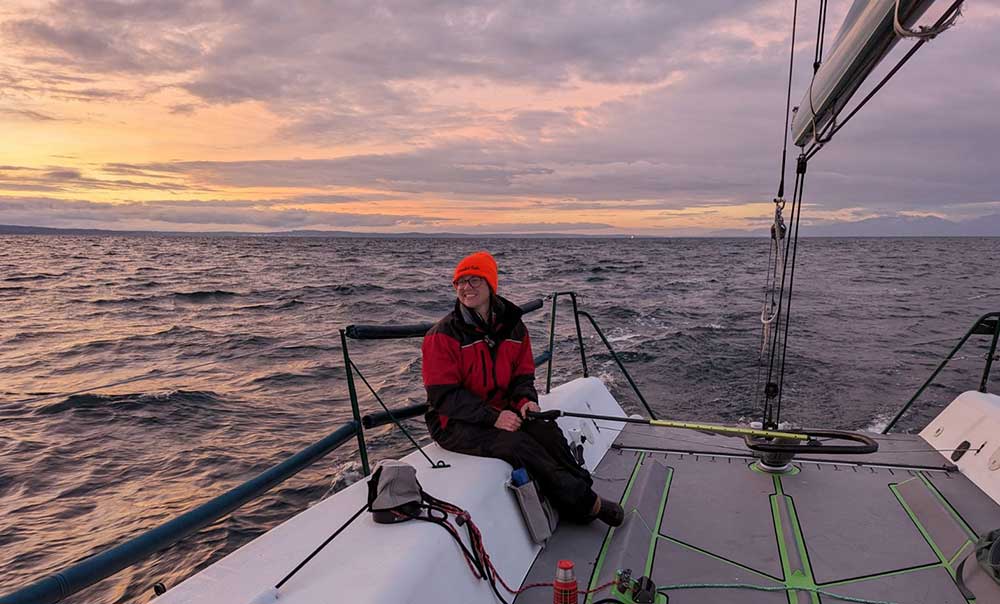
Dad and I had just begun to trade the stories of the day when my darling husband joined us. We learned quickly that if I laughed too hard, my monitors would make very concerned noises about my heart rate and breathing. We got to chat with my very freaked-out mother too. Luckily, my husband and mother didn’t know that anything had gone wrong until I was safe and warming. I can only imagine the panic that they would have endured if they’d heard before we were pulled from the water.
I’m the sort of person who says I love you in excess. Every time I leave the house to pop to the grocery store, every time someone heads off to work, every time a dear friend hangs up the phone, “I love you.” In those moments under the boat when I wasn’t sure I was coming back up, I didn’t have to wonder about the last thing I’d said to my friends and family. I never really knew why I said I love you so much before, but I do now, and it will never change.
Within an hour or so, my temperature was back over 98. My doctor informed us that, by some miracle, all of my tests had come back perfectly. My heart, electrolytes, muscles, lungs, were all functioning just as intended. Brent was down the hall from me—we got to check in and make sure he was ok before leaving, I was not about to take anyone’s word on his well-being.
By the time we all piled into the car, sailor that I am, I was in desperate need of a beer. I mean, if ever a day deserved it. We made it to the marina about the time the boat was getting settled at the dock, and I got to give and receive many much needed hugs, get a beer in hand (along with lots of water, of course) and debrief with my crew. These people, who I trust with everything I have, held my life in their hands. And they knew it. The MOM unit was in the water before I’d taken my first breath above water, which kept us afloat and allowed us to be found. The Coast Guard was hailed within moments with the GPS coordinates that brought the Kitsap County Sheriff’s boat, half our fleet, and a freaking ferry to my position. Had no one found us, my boat would have been 5 minutes behind our rescue team to pick us up. Those would have been a long 5 minutes, but we would have made it, because I sail with the best crew on the Sound. If any of those things hadn’t happened, I would be dead. Let that be sobering and incredibly comforting in the same moment.
The gratitude that I have for the last few days cannot be contained in words. To everyone that has reached out to me directly—I love you, and I too am so unbelievably glad I’m alive. Thank you to my Mom, who let me swim in really cold water as a kid, even though it seemed like a bad idea (it wasn’t). To my crew, who followed protocol and made it possible for me to sail another day. To Absolutely, who pulled sail immediately, because we mattered more than the race did. To the Coast Guard, who managed VHF communications with my skipper to get the word out, and sent a helicopter out to (fortunately only) watch over the rescue. To Freya, for finding us and leading the way. To Lodos (oh my GOD to Lodos) for getting us out of the water. To the Kitsap County Sheriff’s Department for truly astonishing boat, situation, and people handling. To the Edmonds/Kingston ferry Suquamish and an entire boatful of passengers who divert course to come and block the wind for our rescue. To Troy Hutt, who recorded the rescue from the ferry, providing an invaluable resource for LifeSling and man overboard recovery training. To every other boat that pulled sail and came for us, just in case they could help. To my ancient, wonderful, beat-up lifejacket that got me safely underneath a race boat moving at unimaginable speeds, above water, and stable for 45 minutes in a situation that I should not have survived. And to Brent Campbell. As I said in the water so many times, “I’m so sorry you’re here too, but I’m so glad I’m not alone.” I now have about 1,000 life debts that I can never hope to pay off.
I will sail again. I’ll start small, curled up around a pushpit in (hopefully) 5 knots of breeze, and I’ll work from there. I have absolutely no regrets, with one exception… I wish I had tightened my lifejacket that morning. Thank you to everyone, everything, and every god. I love you all.
Sheridan Ferguson lives aboard with her husband and two boat cats on Lake Union in Seattle. She’s been racing and cruising Puget Sound from an early age.

